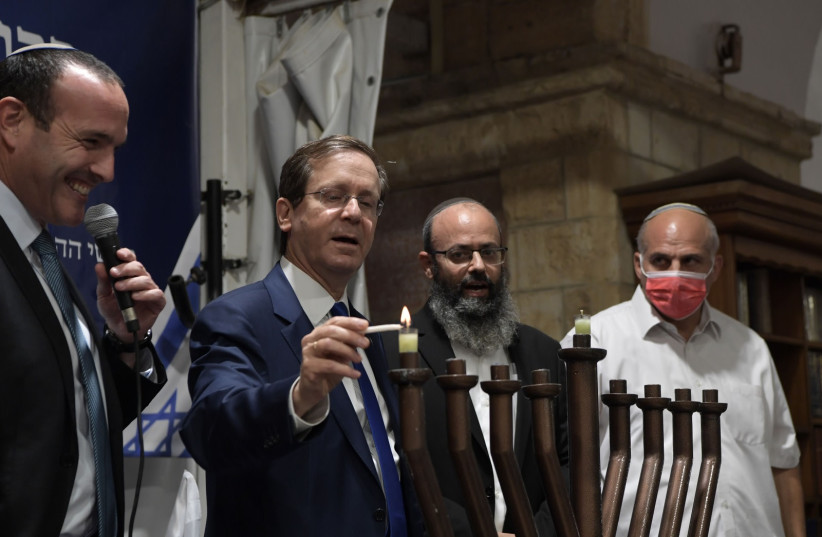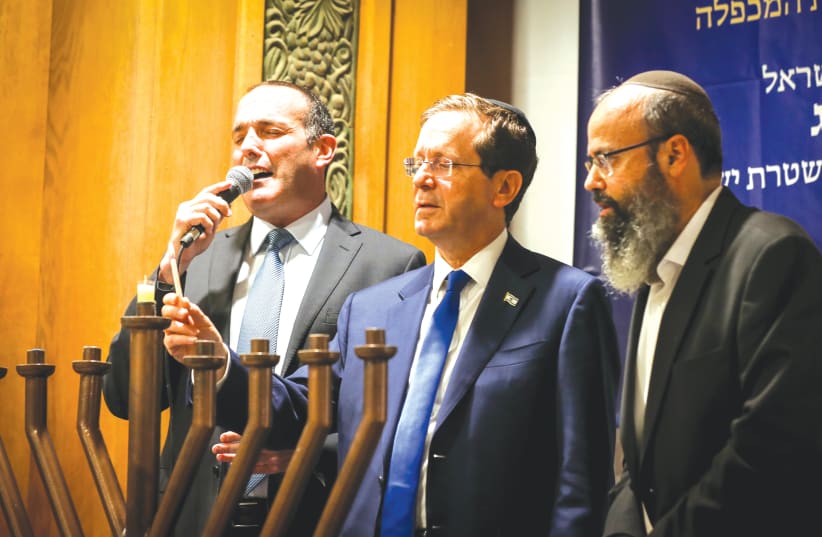On Sunday, President Isaac Herzog lit the first Hanukkah candle in the most ancient Jewish site, Ma’arat Hamachpela, the Cave of the Patriarchs in Hebron. The Jewish connection to the city reaches back to biblical times. In the Torah portion which we read last week, we are told that “Jacob lives in the city of forefathers,” that after a long sojourn in Haran he returned to his homeland and lived in Hebron. It was where the oldest land sale contract in human history was drawn up, when Abraham negotiated with the local residents to purchase the Cave of the Patriarchs as a burial site for his wife Sarah, paying above market price.
For Herzog, it’s a deeply personal moment. He is carrying on the legacy of his father, the late president Chaim Herzog, who also served as Israel’s ambassador to the United Nations. In 1976, the elder Herzog distributed a copy of the biblical verses outlining the details of the sale of the tomb to members of the UN. As the JTA reported: “For the first time in history, an agreement made almost 4,000 years ago and recorded in the Bible has been issued as a United Nations document today.”
In a speech at the time, he declared the historic Jewish connection to the holy site, second in importance to the actual Temple Mount in Jewish history and tradition. Chaim Herzog also spoke about his unique connection to Hebron as it was one of the cities controlled by the tribe of Levi in ancient times, and Herzog was a Levite himself. He had been encouraged by the Lubavitcher Rebbe to speak out about this connection to Hebron in the UN.
The menorah lit on Sunday by President Herzog carries on this tradition of standing up for the deep Jewish bond to the Land of Israel. Three reasons are commonly argued to substantiate the Jewish people’s connection to Eretz Yisrael: Firstly, history – Jews have always lived in Eretz Yisrael, and we modern Jews only continue that legacy. Secondly, Jews need a place of haven and refuge – we have learned so tragically that without a place where we can chart our own destiny, our people remain at mortal risk. Finally, that international law endorsed the quest of Jews to establish a state, as supported by the Balfour Declaration and the UN.
Each of these arguments carries weight but also has weaknesses. Would history justify giving the Dutch the state of New York because they ruled there hundreds of years ago? One could argue that maybe being spread out around the world lessens the risk of danger to the Jewish people, as opposed to being concentrated in one place. And those decisions by the international bodies establishing Israel was imperialism at its worst.


However, there is one deeper argument, rooted in our tradition. The Land of Israel is uniquely the home of the Jewish nation because God gave it to us. God created the heavens and the earth and all it contains, the Torah tells us at the very beginning of its narrative. Rashi, the foremost Torah commentator, points out the seemingly unsuitable placement of this verse at the very beginning of what is essentially a book of moral and spiritual guidance. It’s there, he explains, to emphasize to those who accuse the Jewish people of stealing the land that God is the creator and owner of the entire universe and it was He who gifted the land to the Jewish nation.
Herzog’s visit to Hebron underscores this point. It’s for this reason that the political Left in Israel has erupted in protest of his symbolic act. They wish to diminish the idea that we, as a people, have a spiritual connection to the historic homeland of the Jewish people, not just a political one. They would like to obscure the fact that as part of the Jewish mission to bring morality, monotheism and ethics to the world, we need a land where we can perform the unique commandments linked to that land.
President Herzog has brought to his presidency a deep spiritual legacy, one that reaches back generations. His great grandmother was living in Hebron in 1929, barely surviving the massacre that killed 69 Jews. His saintly grandfather, chief Rabbi Herzog, stood up during the darkest days of the Holocaust to actively protest to save world Jewry. Now in Hebron, he is carrying on the tradition of this father, standing up to the world and unabashedly saying: “Yes, we have a connection to Hebron.” When Jews see a president who is not afraid to stress that deep spiritual bond to our historic homeland, it instills in them a sense of history. And their bond will only get stronger.
The writer, a rabbi, is president of the Rabbinical Council of Orange County, California. Email: rabbi@ocjewish.com
